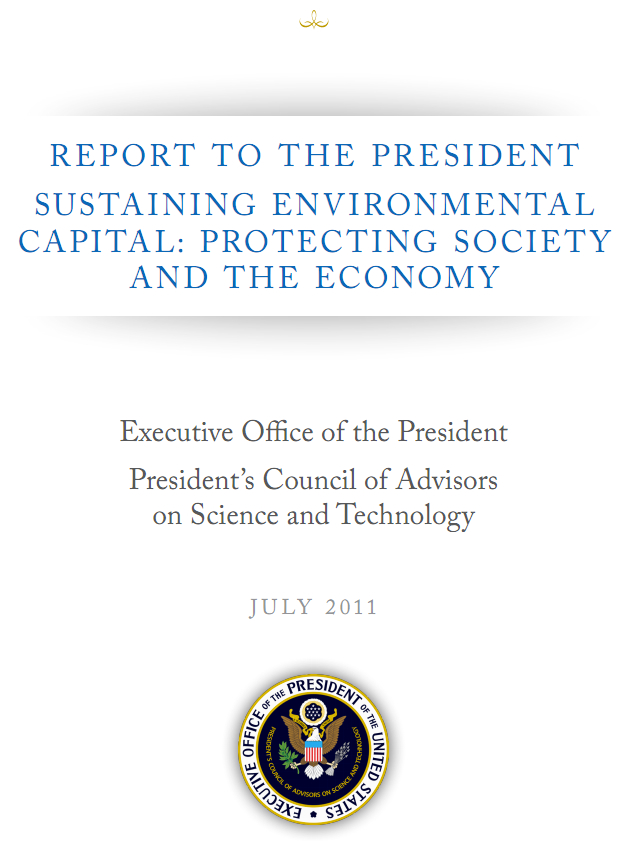 The President’s Council of Advisors on Science and Technology (PCAST) released a report titled Sustaining Environmental Capital: Protecting Society and Economy, calling for improved accounting of ecosystem services and greater protection of environmental capital.
The President’s Council of Advisors on Science and Technology (PCAST) released a report titled Sustaining Environmental Capital: Protecting Society and Economy, calling for improved accounting of ecosystem services and greater protection of environmental capital.
The report notes the importance of the nation’s ecosystems and biodiversity to the overall economy, and recommends that the Federal government institute and fund a Quadrennial Ecosystems Services Trends (QuEST) Assessment that draws upon existing monitoring programs as well as newly recommended activities to identify trends related to ecosystem sustainability and possible policy responses.
Importantly, PCAST also recommends that we expand the use of evolving informatics technologies — drawing from another recent PCAST report about networking and information technology R&D:
As noted in a recent PCAST report, “… the advancement and application of [networking and information technology is] squarely at the center of our Nation’s ability to … address essentially all of our challenges.” Policymakers who deal with biodiversity and ecosystems issues have a pressing need to be able to make scientifically and socially informed decisions in order to ensure the continuation of essential human services from natural systems. To provide the information these policymakers need in forms they can use, the capabilities of informatics … must be brought into play, including:
- modeling and simulation decision support software that can incorporate the many kinds of data, and the massive amounts of data, needed to build predictive scenarios that take into account the complexity of natural systems and the impacts and competing demands of human systems; and
- the underlying data and information infrastructures that mobilize data for use in these simulations and models.
In particular, PCAST notes:
The collection of data is an essential first step in the powerful and rapidly developing new field of informatics, a term that refers broadly to the mathematical and computing techniques used to glean new understanding from the increasingly massive volume of data available in the natural and social sciences, humanities, medicine, engineering, business, law, and other domains. The power of these techniques for deriving insights about the relationships among biodiversity, other ecosystem attributes, ecosystem services, and human activities is potentially transformative.
The challenges in developing and applying informatics technologies in this domain are commensurate with the potential. They begin with the extreme heterogeneity of the data, which come from disparate disciplines and, within environmental science, from multiple kinds of monitoring platforms, both groundbased and remote, at many different observational scales and for many different time periods. An informatics infrastructure to deal with all this must embody mechanisms for making data openly and promptly available in formats accessible to both human and machine users; standards that permit interoperability, which must be embraced by all participating sectors; and decision support software incorporating insights from—and responsive to the needs of—government, industry, and academia.
(The “extreme heterogeneity of data,” along with the need for an informatics infrastructure that enables management and analysis of these data, were also the key conclusions of 60+ leading researchers — spanning computer science as well as the domain sciences — who participated in a February 2011 NSF/CCC workshop on the Role of Information Sciences and Engineering in Sustainability. See the CCC report on sustainability here.)
To acheive the recommendations described above, PCAST further recommends that the National Science and Technology Council (NSTC) establish an Ecoinformatics-based Open Resources and Machine Accessibility (EcoINFORMA) Initiative. A primary goal of the EcoINFORMA Initiative would be to ensure that Federal datasets relating to environmental health — as well as supporting socio-economic and geophysical data relevant for ecosystem valuation and decision-making — are published in machine-readable, interoperable formats to facilitate use by various stakeholders, including academic researchers, community organizations, and public policy officials. Specifically:
EcoINFORMA should seek out and encourage partnerships with the private and academic sectors to maximize financial savings and develop innovative tools for data integration, analysis, visualization and decision making. Though government agencies have the most pressing need of the decision support tools described above, the academic and private sectors are most likely to have the innovation capacity needed for tools development. The tools that are needed will have voracious appetites for data, which the government sector is best able to provide. As agencies are inspired to collaborate by the complex challenges of our time, cost efficiencies are most likely when two or more agencies partner with private and academic entities to develop tools that will serve all partners, as well as the general public.
There’s lots more excellent material about the role of IT research in sustainability contained in the report — indeed, an entire section is devoted to “Using Informatics to Support the Sustainability Agenda” — and I encourage you to take a look.
(Contributed by Erwin Gianchandani, CCC Director)









